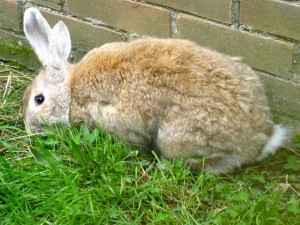Sanctuary Life
Housing your pet rabbit
Whether you are buying a baby rabbit or an adult you have to make sure that the accommodation you provide will be big enough. Youngsters grow quickly and some rabbit breeds are very large. As far as the hutch is concerned, the bigger the better. The tiny, flimsy cabins that are so often on sale are only suitable for temporary accommodation. Imagine how it would feel to be penned up in such a small space. Whilst the sleeping quarters for your new pet can be cosy (think about a warm, dry, snug burrow), there will need to be plenty of additional space for eating, sleeping and toilet arrangements. If it’s bad weather your rabbit may not be able to go outside.
A shed is far better than a hutch, you can make different areas inside and a ladder up to a feeding shelf (not too high though) is much liked. You have the height to allow for fresh air and also some storage space for food etc.
If you put a wire netting inner door on the shed your rabbit can see outside, it’s double security when you shut him up at night. A ‘pop-hole’ allowing him to go out in his run is a good way to organise the accommodation.
Where you site the shed is important. Make sure the door isn’t in the direction of the oncoming wind, also that there is shelter from direct sunlight. Sheds can be a bakehouse in summer and your rabbit will need some shade.
Rabbits have a fur coat which grows even denser in the winter, but they are still captive and can’t escape to a warmer place, they have to put up with what we provide. Think about whether you would be warm enough when it’s the middle of winter. There definitely should not be frost inside the shed and a cosy den filled with hay is essential. It’s good to insulate the walls and you don’t have to buy anything expensive. Left over polystyrene does a good job, also thick layers of bubble wrap, sheep’s wool or straw is ideal, even newspapers. You will have to cover all the insulation with a cladding of timber, which could be plywood or stockboard. This is to stop your rabbit nibbling on something he shouldn’t! Make sure any material you use isn’t toxic to pets. There are question marks over MDF – it’s said not to be good for humans even so I wouldn’t use that in any animal housing.
The extra thickness will give some protection from predators but bear in mind that a determined fox will rip thin timber and flimsy wire apart quite easily and get into his rabbit ready meal. It’s a horrible fate for a pet – bear this in mind if buying one of the lightweight hutches you see on sale. It takes no time at all for a big dog fox or hungry vixen to get in there.
We are not blaming the foxes for this – they are hungry – although please don’t feed them in your back gardens. It encourages them into different behaviour and an urban environment putting all other pets and newborn animals at risk. A return to traditional farming practices would do much to let the foxes settle back into their former habitats and lifestyle. The huge manicured fields and lack of habitat for wild creatures means the foxes now have little natural food to eat. They are scavenging animals who normally pick off the old, sick or weak. What is there for them to eat nowadays? The wildlife on most farms is disappearing. Sadly, the farming industry seems set on being ever more intensive and unnatural in the way it keeps animals. Chemicals, mechanization and profit is king.
While you are setting up your large hutch or shed, make sure that it’s easy to clean. It’s good to have a hay rack so your rabbit has clean fodder at all times. Hay is the most important rabbit food. A shallow tray or liner in the toilet area keeps it clean. Water in a nice stone ware or stainless steel dish that can’t be tipped up. Food in secure tins with lids so that other small creatures don’t help themselves and foul the meals in the process. Attention to detail makes rabbit housekeeping quick and easy to do – a pleasure and not a chore.
We have rabbits for adoption – please get in touch if you’d like to come and see them. Also rabbits who are permanent sanctuary residents – you can ‘adopt’ one of our rabbits for £10 per year – and have their story, photo and updates – a Pet Samaritans badge too. Email your name and address and send a donation by paypal. If you’d like adoption for a gift please let us know who to send the adoption pack out to -many thanks.
[donate]

